Today I will show you how to answer the “Why consulting?” interview question.
In fact, “Why consulting?” or “Why management consulting?” is one of the questions you must answer in ALL your job interviews.
Yet most candidates struggle with crafting a good answer to the “Why consulting?” question.
Even worse: many candidates do not meet the interviewers’ expectations and fail their interviews because of poor answers!
For instance, most candidates make at least one of the two mistakes discussed in this article.
So, not only will I show you in this article how to avoid making these two mistakes, but I will also show you how to make your answer unique and stand out from the pool of other candidates.
Important: besides fit interviews, you must stand out during your case interviews. Don’t know what to do? Check out this free case interview course to learn how.
Let’s get started right now!
Table of Contents
Get the latest data about salaries in consulting
Understand Why Consulting Firms Ask This Question
The “Why consulting?” question is used by consulting firms to assess your motivation
Along with “Why McKinsey?”, “Why BCG?” or “Why Bain?”.
You must answer this question during your fit interview (or Experience Interview or Personal Experience Interview at McKinsey).
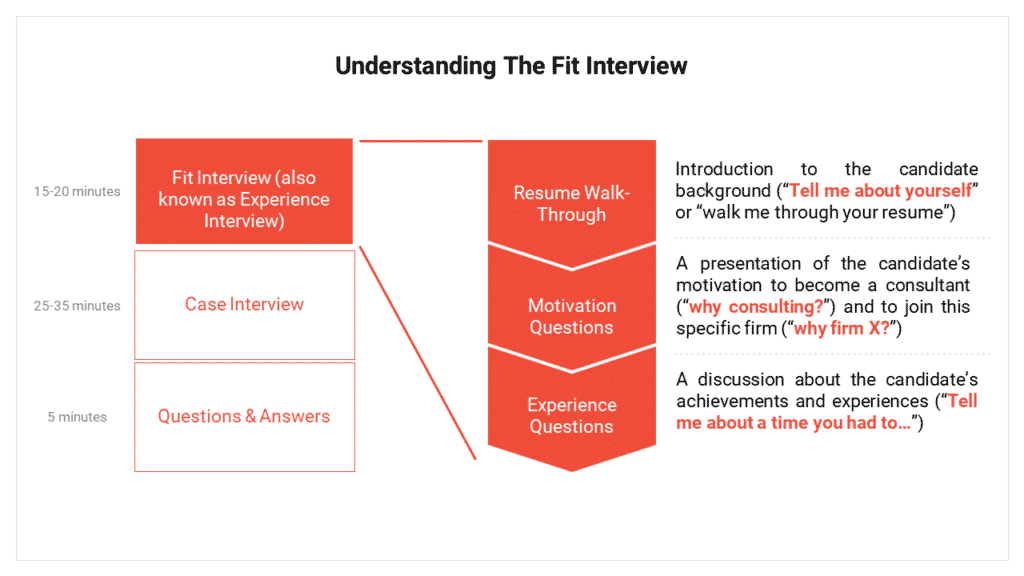
Related articles:
- Master the McKinsey Personal Experience Interview
- Understand McKinsey’s hiring process
- Understand BCG’s hiring process
- Understand Bain & Company’s hiring process
With this question, your interviewer tests if you understand what Consulting is and if you are truly interested in a career in Consulting.
Why?
Because hiring and training a new Consultant is very expensive. Indeed, they invest a lot of money and time in their consultants to hire and train new consultants.
Thus, they don’t want to see you leave the firm after 6 or 12 months.
Plus, they know that many students apply to consulting “by default.”
In other words, many graduate students are undecided about which career they want to pursue.
Therefore, consulting firms test that you are not one of these candidates who will likely leave after a year in consulting.
In conclusion, this question is critical to get an offer from consulting firms such as McKinsey, BCG, or Bain & Company, and you can’t skip having a solid, persuasive answer.
Choose The Reasons Why You Want To Pursue A Career In Consulting From This List
You can have a lot of good reasons to pursue a career in consulting.
For instance, here is a list of reasons why business consulting can be a good idea as a career.
Five Reasons To Pursue A Career In Consulting That Can Be Mentioned In Interviews
- You'll have a strong impact: you'll have the opportunity to work on and solve the most pressing problems faced by big corporations
- A strong exposure to C-level Executives: early on in your career, you'll work directly for CEOs, CFOs, CMOs, etc. and start developing the soft skills to become an Executive later
- The learning curve: Consulting firms invest a lot in training their consultants. In addition, the feedback culture is very strong and you'll get full performance reviews regularly
- You'll work with bright people: consultancies pride themselves on hiring bright people. Plus, with 3-month projects on average, you'll meet a lot of different people in consulting
- The opportunity to work in an international environment: large consultancies sell work to businesses and governments all around the world
Four Other (Good) Reasons To Pursue A Career In Consulting (But That Can Not Be Mentioned In Interviews)
- It's a good career choice after University if you don't know what to do: if you don't know what to do after University or after your MBA (you're not alone!), then Consulting is a safe bet. You'll have the opportunity to explore which career, sector or specialty is right for you
- You'll have access to an amazing alumni network: having worked in a consulting firm will give you access to its alumni network that will help you throughout your career
- Great exit opportunities: headhunting firms or big corporations love ex-consultants. Even now, 5 years after I left Consulting, head hunters still contact me on Linkedin to point out interesting opportunities
Avoid These 2 Mistakes (Done By Most Candidates)
When I was in Consulting, I interviewed dozens of people.
Since I coach candidates to prepare for their interviews, I have helped more than 350 people.
And, 90% of the time, I see candidates making the same two mistakes when a candidate answers the “Why consulting?” question.
Mistake_#1: Having A Generic Answer Your Interviewer Already Heard A Hundred Times
A common mistake is to choose 2 or 3 reasons from the list above and craft an answer like the one below.
A bad “why Consulting?” sample answer:
“I would like to move into consulting for 3 reasons.
First, because of the learning curve. In consulting, I’ll be surrounded by very smart people, and be exposed to a wide range of problems, which will help me grow both personally and personally.
Secondly, because of the variety of problems. I can get easily bored and like to be intellectually challenged. Consulting is attractive to me because I know that I will be working on a new project every 3 months on average.
Thirdly, because of the strong exposure to C-level discussions. My ambition is to become a senior executive one day and I believe that Consulting is the right career path towards that goal.“
These are all good personal reasons.
However, I can tell you that 99% of your competitors will have the same kind of answer.
Thus, not only do you lose an opportunity to stand out, but also, you risk failing your interview.
Why?
Because your interviewers will not be impressed by this kind of answer.
They can easily make this shortcut:
You are one of these “consulting is a career choice by default” candidates who haven’t done their homework and are not truly interested in Consulting.
Thus, they won’t risk moving you forward into the hiring process (and therefore taking the precious time of another Consultant).
Or, even worse: make an offer to a candidate who will leave after 6 or 12 months.
I will tell you in a moment the secret to avoiding crafting a generic / heard-one-hundred-times answer.
Mistake_#2: Not Showing How You Can Be An Asset For The Firm
To begin with, you must understand that one of the main objectives of the job interview is to show that you can do the job.
In other words, one of the main objectives of the hiring process is to show that you have the skills to be a good Consultant.
And the “Why consulting?” question is no exception.
For instance, imagine you have an interview with a Partner at McKinsey or the Boston Consulting Group.
The objective of this guy is to sell between $3m and $5m of consulting projects every year.
Now, read again the sample answer above.
What do you think the Partner has in mind when listening to this response?
I can tell you:
“I am glad that you will enjoy being a Consultant, but how the heck are you going to help me achieve my annual $4M sales target?”
In conclusion, when answering the “Why management consulting?” question, a list of personal reasons you want to move into Consulting is not enough.
Instead, show how you can be an asset to the company.
In other words, how you can bring value to the firm and its clients.
This article will show how in a moment.
Use This Framework To Have A Singular And Persuasive Answer
The 3 Guiding Principles Behind The Framework
Before I show you the framework for a perfect answer to the “Why consulting?” question, let me tell you first the three key guiding principles behind this framework.
To begin with, the first two guiding principles are about showing your interviewer that you understand what Consulting is and that your desire to pursue a career in Consulting is a thoughtful decision.
Principle #1: Show that you UNDERSTAND WHAT CONSULTING IS. In other words, your interviewers test that you did your homework (e.g., you talked to Consultants, you browsed their websites, you read articles written by their Consultants, etc.); This will give them a positive signal that you won’t leave after six months because you understand the pros and cons of the job.
Principle #2: Tell the interviewers WHY the reasons you want to pursue a career in Consulting are important for YOU. This will give them another positive signal that you won’t leave after six months because moving into Consulting is a THOUGHTFUL DECISION. In addition, this will make your answer unique and personal (vs. generic and not memorable).
Thus, if you follow the two guiding principles above, you will have a solid answer to the “why Management Consulting” question.
However, you can have an even better answer if you follow the third guiding principle. Thus, you will avoid making the second mistake discussed above.
Principle #3: Tell the interviewer how you will BRING VALUE and be an asset to the firm. Your answer should be about how positive consulting can be for your career and which SKILLS you can bring to the firm.
These three principles are simple, aren’t they?
No?
Okay, let’s discuss using these guiding principles to craft a perfect answer to the “Why consulting?” question.
Get 4 Complete Case Interview Courses For Free

You need 4 skills to be successful in all case interviews: Case Structuring, Case Leadership, Case Analytics, and Communication. Join this free training and learn how to ace ANY case questions.
The Structure Of A Perfect Answer To The "Why Consulting?" Question
Here is the framework I recommend using when answering the “Why consulting?” question.
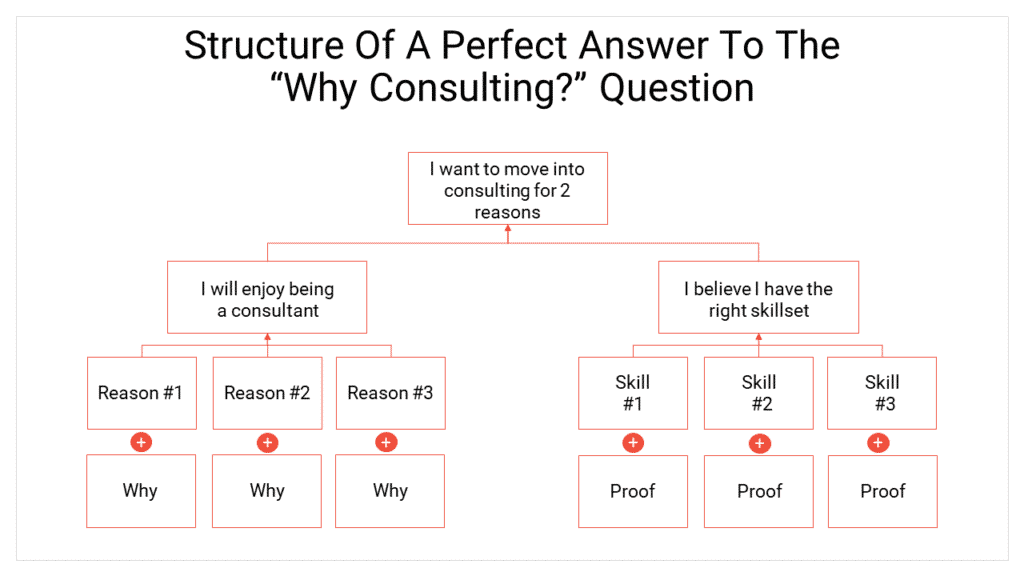
Use this framework, and I guarantee that not only will you meet your interviewers’ expectations, but you will also stand out from the crowd.
Start By Saying Why You Are Going To Like Being A Consultant
As you can see, the first part of the framework is about saying why you will like the job.
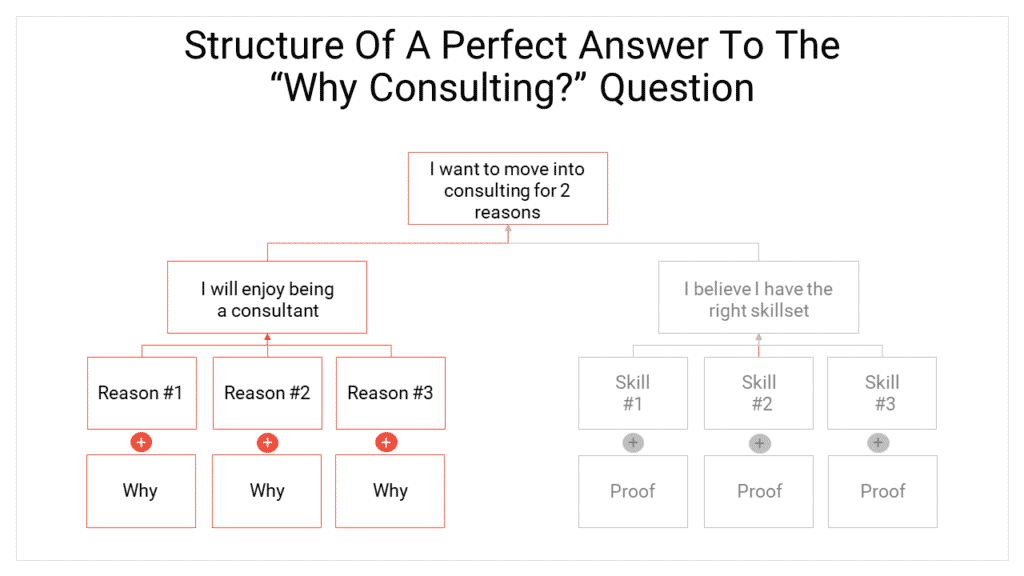
To do so, pick up 2 or 3 reasons from the list above (ideally three as presented in the framework).
Then, show your interviewer that you haven’t picked up these reasons randomly but that they result from thoughtful decision-making (Principle #2) or/and your conversations with a Consultant (Principle #1).
First, how do you show your interviewer that your reasons result from thoughtful decision-making (Principle #2)?
It’s very simple: linking the reason to your past experience.
Good example: “I think the main reason I want to pursue a career in Consulting is the impact I will have. I find it stimulating to see how my ideas influence a company’s performance. For instance, when I worked as a Marketing Assistant at Samsonite, I contributed to growing their sales by +7% in the Spanish market by developing a tailored marketing campaign.”
Secondly, how do you show your interviewer that your reasons result from conversations with Consultants (Principle #1)?
It’s even more simple than earlier: by mentioning that you talked with some Consultants (better if you say their names)
Good example: “I think that another reason why I want to pursue a career in Consulting is because of the people working in Consulting. All the interactions I had with Consultants left a strong impression on me. I have found them to be well-articulated and able to take a high perspective on a business issue. This is the professional I want to be.”
End By Saying That You Have The Right Skill Set
Next, you can see that the second part of this framework is about telling your interviewer why you will be an asset to the company.
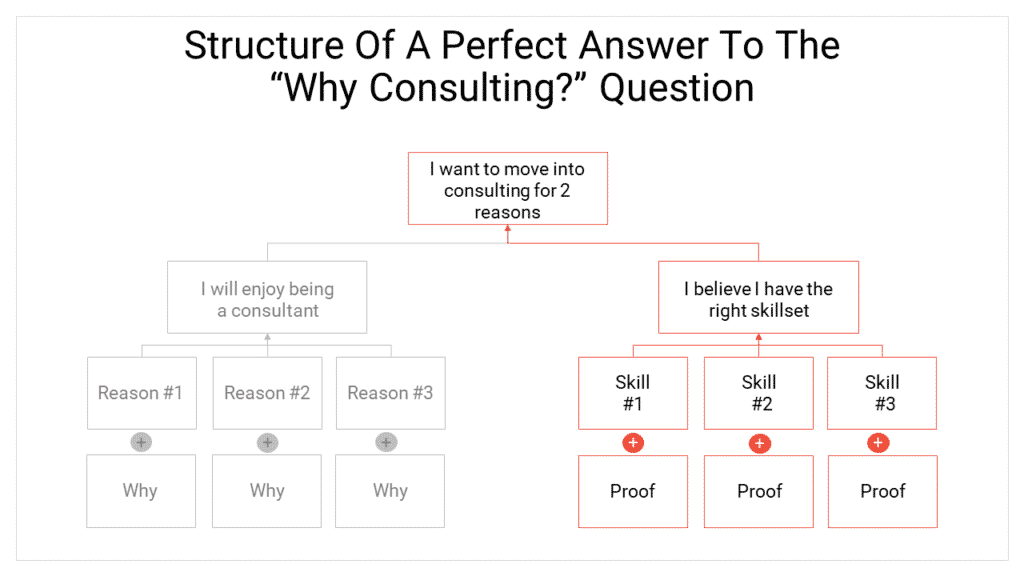
In other words, this part is about saying which skills you can bring to the firm’s teams (Principle #3).
For instance, you can mention your problem-solving or your leadership skills.
However, to say that you have these skills without any proof is nothing but bragging.
Bad example: “I believe I can be a successful Consultant because I have strong problem-solving and leadership skills.”
That’s why you must add an example (for each skill you mention) showing in which context you used your skills (shown as “proof” in the framework).
Good example: “I believe I can be a successful Consultant because I have demonstrated my ability to solve complex problems during my career. For example, when working as a Marketing Assistant at Samsonite Spain, I designed an omnichannel marketing campaign, resulting in a sales growth of 12% year over year (120% of the target). In addition, I have also demonstrated an ability to convince people to follow my ideas. For instance, as a student at INSEAD, I convinced the career department and the student association to change the organization of the annual job fair by showing them the drop in attendance of companies and students for 4 years.”
To conclude, before using this framework to craft your own answer, check the full sample answer below to see what a good answer looks like.
One last comment before sharing a sample answer: I recommend limiting your answer to 2 minutes max (and 1.5 minutes minimum) when you develop your answer.
Get Inspired By This "Why Consulting?" Sample Answer
Use the example below to develop your own answer to the “why consulting?” question.
Interviewer: “ok, now can you tell me why you want to pursue a career in consulting?”
The candidate: “Sure. I thought a lot about what could be the best career path after my MBA. And today, I am convinced that Consulting is the best career choice for me.
First, because I enjoy all aspects of the job. Secondly, because I believe that I have the right skill set to become a successful Consultant.
To begin with, let me tell you why I am going to enjoy being a Consultant.
I think that the main reason is the impact I will have. Per my readings on your website, I understand the types of projects you do and how these projects can make a difference for your clients. For instance, I read that you did a project for a leading chemical company and how sales increased after you redefined its pricing strategy. This is exactly the kind of work I want to do. In Consulting, I know that I will have the opportunity to work on the most pressing issues for my clients, this is super exciting. The second main reason is probably the variety of projects. Not only do I hate routine, but also, I am very curious and love learning new things. Thus, I find working on new projects every three months and understanding how businesses work or can be improved very stimulating. Lastly, because of the people working in Consulting. All the interactions I had with Consultants left a strong impression on me. I have found them to be well-articulated and able to take a high perspective on a business issue. This is the kind of professional I want to be.
Now, let me tell you why I believe that I have the skills to become a successful Consultant.
First, as an Engineer by training, problem-solving is part of my DNA. I love moving step-by-step from the problem to an actionable solution. For instance, when I was a plant Engineer at [Company Name], I had to understand why the productivity decreased by 10% in 3 months. I listed all the potential causes for that decline and gathered the data to determine which cause was actually impacting our productivity. From there, I worked with the different Engineering teams to build a plan to improve our productivity back to normal. Secondly, I think I can also bring my leadership skills. As a plant Engineer, I managed a team of 2 other Engineers. As a team, we had to solve many production problems under tight deadlines, sometimes on the same day! I always managed to solve these problems on time by nurturing a result-driven culture among my team members.
To conclude, I am convinced Consulting is a perfect match with my past experiences, skills, and career aspirations. And now I look forward to delivering strong results to your clients.”
Show Your Motivation With Your Voice And Body Language As Well
You can have a well-articulated answer saying why you want to pursue a career in Consulting.
Still, if your voice and body language says something different, your interviewer will likely not be convinced.
Actually, many studies show that, in communication, body language and voice are more important than the words you are saying!
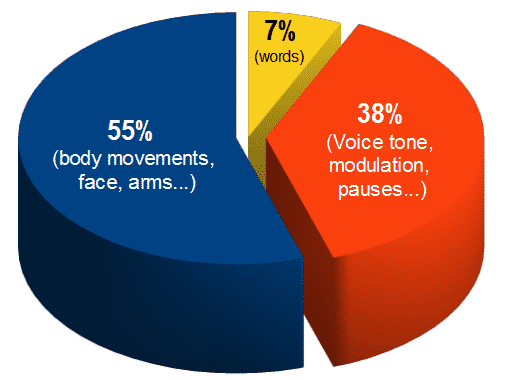
So, how do you show your motivation with your body language and voice?
First, you must know your answer by heart.
So that during the interviews, you will not have to think about the content, but only about your body language and your voice.
To do so, I recommend you repeat 5 or 6 times your answer out loud before your actual interviews.
Next, use the following 3 tips to alter your body language and give off a more confident impression:
- Maintain an assertive posture
- Watch your hands. Especially stop fidgeting.
- Maintain appropriate eye contact
Now It's Your Turn
There you have it: how to answer the “Why consulting?” interview question.
Important: besides fit interviews, you must stand out during your case interviews. Don’t know what to do? Check out this free case interview course to learn how.
Now I’d like to hear what you have to say:
Which reasons are you going to say during your job interviews?
Or maybe you use a strategy that I didn’t mention here.
Either way, let me know by leaving a quick comment below.
Sébastien
Get 4 Complete Case Interview Courses For Free

You need 4 skills to be successful in all case interviews: Case Structuring, Case Leadership, Case Analytics, and Communication. Join this free training and learn how to ace ANY case questions.
SHARE THIS POST

Pingback: How to answer “Why McKinsey?”, “Why BCG?”, or “ Why Bain?” questions - Career in Consulting
Pingback: All About The McKinsey Recruitment Process - Career in Consulting
Pingback: All About The BCG Recruitment Process - Career in Consulting
Pingback: All About Bain Recruitment Process - Career in Consulting
Thank you Sebastian
THanks!
One amazing article that i have found:)
Thank you!
Great piece of work Sebastien, I enjoyed this! Thank you
Thank you. I am glad you liked it.
Thank you so much Sebastien! I found very usefull your article.
Great! Glad you liked it
This is useful….but how can we memorize such a big piece of info for just this one question?
Your answer should not be more than 2 minutes!
Thank you
could you tell me please what kind of questions the interview would ask me in the part of (tell me a time you had to ) can you give examples.
Thank you
could you tell me please what kind of questions the interview would ask me in the part of (tell me a time you had to ) can you give examples..
Hello Mouna. This is a good idea. I’ll write an article to answer your question soon!